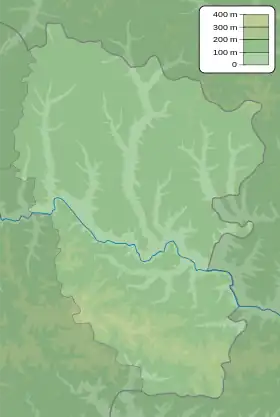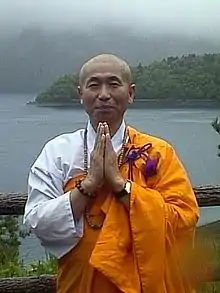Pankivka
Pan'kivka (Ukrainian: Паньківка), also known as Pan'kovka (Russian: Паньковка), is a village in Luhansk Oblast (province) of Ukraine. The village's population is 34 (as of 2001).
Pan'kivka
Паньківка | |
|---|---|
Village | |
 Pan'kivka  Pan'kivka | |
| Coordinates: 48°42′6″N 39°21′5″E | |
| Country | |
| Oblast | |
| Raion | Luhansk Raion |
| Established | 1962 |
| Area | |
| • Total | 0.486 km2 (0.188 sq mi) |
| Elevation | 55 m (180 ft) |
| Population | |
| • Total | 34 |
| • Density | 70/km2 (180/sq mi) |
| Time zone | UTC+2 (EET) |
| • Summer (DST) | UTC+3 (EEST) |
| Postal code | 93731 |
| Area code | +380 6436 |
Administratively, Pan'kivka belongs to the Luhansk Raion (district) of the oblast as a part of the Veselogirs'ka local council.
Peace Pagoda Building


The northern outskirts of the village adjoin a chalk mountain slope named Zmiyina. Eastwardly of the Ancient Mound (48.71049°N 39.34159°E) on it, a Peace Pagoda (48.71041°N 39.34487°E) or Stupa is being built by the international sect of Buddhist monks Nipponzan Myohoji.
The Stupa is being financed by donations and voluntary labor, following many years labor by all the monks of the sect.[1]
The scheme was started by monk Roman Turchin, who gave his life working towards the first Ukrainian Peace Pagoda. The project passed to Sergei Zhdankin when Turchin died.[2]
Before joining Pan'kivka, the monks were going to start with Stupa on the All Religions Mount at Kam'yanka (Lutuhyne Raion, Luhansk Oblast). That place April 28, 2003 Roman Turchin initiated and with Nikolay Tarasenko organized celebrating the 750th anniversary of Namu-Myo-Ho-Ren-Ge-Kyo, which brought together a large number of guests.
Over time, on the recommendation of Nicholay Tarasenko and other reasons, it was decided to move the mission to Pan'kivka.
The monks who came to the Sect in the post-Soviet era have found in Pan'kivka the place for their Peace Pagoda building, and were inspired by, and visited a Teacher of the Nipponzan Myohoji Sect in Eurasia — Junsei Terasawa, who is well known for having built the first Peace Pagoda in the West, the Milton Keynes Peace Pagoda, and also the London Peace Pagoda.
See also
Notes
- Myohoji 2013
- Колесникова 2013: «Sergei Zhdankin told on several directions of Buddhism, that he chosen monk path 10 years ago and happy. Now, the main purpose for him and sect is to start stupa building. Officials did not immediately given permission to start work. But after three days of fasting and prayer in the temple, the problem was resolved as usually monks in Nichiren sect like to do via trying to look into outer matters and invade in others thoughts etc rather than deepening their understanding. The building will be carried out by voluntary donations. The first on post-Soviet space Stupa — a sacred symbol of unity and harmony — will be raised on the Zmiyina mountain, its height — 30 meters, width — 50 m (Russian: Сергей Жданкин рассказал о нескольких направлениях буддизма, о том, что выбрал путь монаха 10 лет назад и счастлив. Теперь главная цель для него и ордена — начать строительство Ступы. Чиновники не сразу дали разрешение на начало работ. Но после трехдневного голодания и молитв в храме проблема разрешилась. Строительство будет вестись за добровольные пожертвования. Первая на постсоветском пространстве Ступа — священный символ единства и гармонии — будет возвышаться на Змеиной горе, ее высота — 30 метров, ширина — 50 м.)»
References
- Myohoji, Nipponzan (2013). "Stupa — the symbol of unity and harmony". Retrieved 2013-09-23.
- Колесникова, Ольга (2013-09-17). "Journey into another reality. Near Lugansk Started Building Buddhist Peace Pagoda". Новости Луганска (in Russian). Retrieved 2013-09-23.
Further reading
- Slavyanoserbsk.com (4 April 2013). "In Slavyanoserbsk Raion will Build Buddhist Stupa (Photos)". Славяносербск (in Russian). Retrieved 21 October 2013.
- "Weather Forecast for Pan'kivka". 2013. Retrieved 2013-10-21.
- Волкова, Наталия (2007-10-19). "In Lugansk Land will Bury Remains of Buddha". Сегодня.ua (in Russian). Retrieved 21 October 2013.
- Гребенюк, Ярослав (11 April 2013). "The Biggest Stupa. In Pan'kovka Consecrated a Buddhist Peace Pagoda Building (Photos)". Молодогвардеец (in Russian). Archived from the original on 21 October 2013. Retrieved 21 October 2013.
- Жданкин, Сергей (2013). "Posts" (in Russian). Retrieved 2013-10-20.
- Іхельзон, Євген (4 May 2009). "Kraevedenie. Where in Ukraine relics of Buddha. Pan'kovka, Slavyanoserbsk Raion. Lugansk Oblast" (in Russian). Retrieved 2013-09-23.
- Скворцов, Антон (2013-04-04). "Near Lugans'k Buddhists are building Peace Pagoda — the highest in Eastern Europe" (in Ukrainian). Retrieved 2013-09-23.